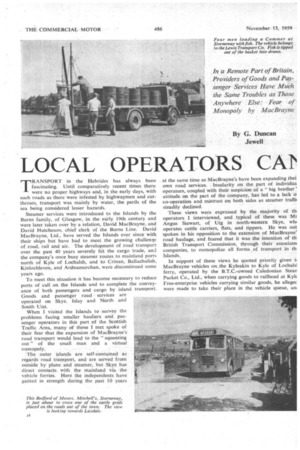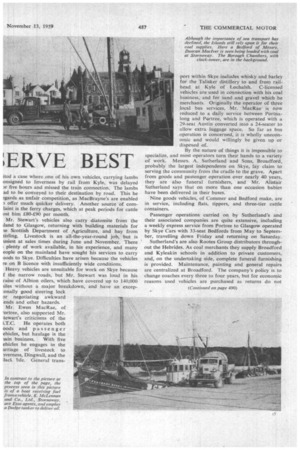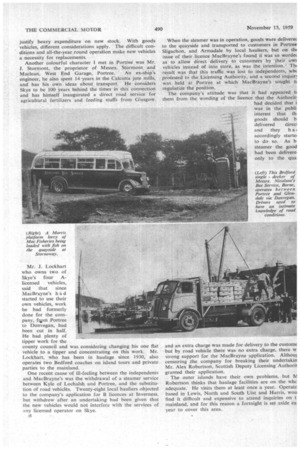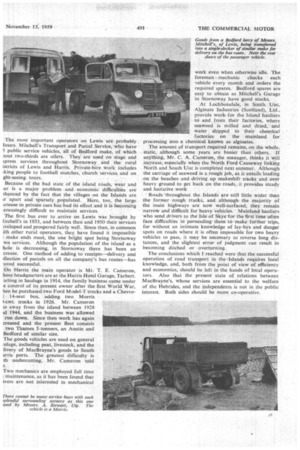LOCAL OPERATORS CAI` ERVE BEST
Page 126

Page 127

Page 130

Page 131

If you've noticed an error in this article please click here to report it so we can fix it.
TRANSPORT in the Hebrides has always been fascinating. Until comparatively recent times there were no proper highways and, in the early days, with such roads as there were infested by highwaymen and cutthroats, transport was mainly by water, the perils of the sea being considered lesser hazards.
Steamer services were introduced to the Islands by the Burns family, of Glasgow, in the early 19th century and were later taken over by a relation, David MacBrayne, and David Hutcheson, chief clerk of the Burns Line. David MacBrayne, Ltd., have served the Islands ever since with their ships but have had to meet the growing challenge of road, rail and air. The development of road transport over the past 40 years severely hit the cargo trade, and the company's once busy steamer routes to mainland ports north of Kyle of Lochalsh, and to Crinan, Ballachulish. Kinlochleven, and Ardnamurchan, were discontinued some years ago.
To meet this situation it has become necessary to reduce ports of call on the Islands and to complete the conveyance of both passengers and cargo by island transport. Goods and passenger road services are operated on Skye, Islay and North and South Uist.
When I visited the Islands to survey the problems facing smaller hauliers and passenger operators in this part of the Scottish Traffic Area, many of those I met, spoke of their fear that the expansion of MacBrayne's road transport would lead to the "squeezing out" of the small man and a virtual monopoly.
The outer islands are self-contained as regards road transport, and are served from outside by plane and steamer, but Skye has direct contacts with the mainland via the vehicle ferries. Here the independents have gained in strength during the past 10 years at the same time as MacBrayne's have been expanding thei own road services. Insularity on the part of individua operators, coupled with their suspicion of a "big brother' attitude on the part of the company, has led to a lack o co-operation and mistrust on both sides as steamer trafb steadily declined.
These views were expressed by the majority of thi operators I interviewed, and typical of these was Mr Angus Stewart, of Uig in north-western Skye, wh( operates cattle carriers, flats, and tippers. He was out spoken in his opposition to the extension of MacBrayne road haulage, and feared that it was the intention of thl British Transport Commission, through their associate( companies, to monopolize all forms .of transport in th Islands..
In support of these views he quoted priority given ti MacBrayne vehicles on the Kyleakin to Kyle of Lochalsl ferry, operated by the B.T.C.-owned Caledonian Stean Packet Co., Ltd., when carrying goods to railhead at Kyle Free-enterprise vehicles carrying similar goods, he allegec were made to take their place in the vehicle queue, an ited a case where one of. his own vehicles, carrying lambs onsigned to Inverness by rail from Kyle, was delayed 3r five hours and missed the train connection. The lambs ad to be conveyed to their destination by road. This he !.gards as unfair competition, as MacBrayne's are enabled 3 offer much quicker delivery. Another sourCe of comtaint is the ferry charges, which at peak periods for cattle ost him L80-£90 per month.
Mr. Stewart's vehicles also carry diatomite from the ;land to Glasgow, returning With building materials for le Scottish Department of Agriculture, and hay from tirling. Livestock is an all-the-year-round job, but is usiest at sales times during June and November. There plenty of work available, in his experience, and many eople on the mainland have sought his services to carry oods to Skye. Difficulties have arisen because the vehicles re on B licence with insufficiently wide conditions.
Heavy vehicles are unsuitable for work on Skye because f the narrow roads, but Mr. Stewart was loud in his raise of Albion oilers, which have covered up to 140,000 tiles without a major breakdown, and have an exceponally good steering lock or negotiating awkward ends and other hazards. Mr. Ewen MacRae, of 'ortree, also supported Mr. tewart's criticisms of the t.T.C. He operates both oods and passenger ehicles, but haulage is the lain business. With five ehicles he engages in the arriage of livestock to iverness, Dingwall, and the ;lack Isle. General trans port within Skye includes whisky and barley for the Talisker distillery to and from railhead at Kyle of Lochalsh. C-licensed vehicles are used in connection with his coal business, and for sand and gravel which he merchants. Originally the operator of three local bus services, Mr. MacRae is now reduced to a daily service between Portnalong and Portree, which is operated with a 29-seat Austin converted into a 24-seater to allow extra luggage space. So far as bus operation is concerned, it is wholly uneconomic and would willingly be given up or disposed of.
By the nature of things it is impossible to specialize, and most operators turn their hands to a variety of work. Messrs. A. Sutherland and Sons, Broadford, probably the largest independents on Skye, lay claim to serving the community from the cradle to the grave. Apart from goods and passenger operation over nearly 40 years, they are also funeral furnishers, and Mr. Alistair Sutherland says that on more than one occasion babies have been delivered in their buses.
Nine goods vehicles, of Commer and Bedford make, are in service, including flats, tippers, and three-tier cattle containers.
Passenger operations carried on by Sutherland's and their associated companies are quite extensive, including a weekly express service from Portree to Glasgow operated by Skye Cars with 33-seat Bedfords from May to September, travelling down Friday and returning on Saturday.
Sutherland's are also Rootes Group distributors throughout the Hebrides. As coal merchants they supply Broadford and Kyleakin schools in addition to private customers, and, on the undertaking side, complete funeral furnishing is provided. Maintenance, painting and general repairs are centralized at Broadford. The company's policy is to change coaches every three to four years, but for economic reasons used vehicles are purchased as returns do not justify heavy expenditure on new stock. With goods vehicles, different considerations apply. The difficult conditions and all-the-year round operation make new vehicles a necessity for replacements.
Another colourful character I met in Portree was Mr. J. Stormont, the proprietor of Messrs. Stormont and Maclean, West End Garage, Portree. An ex-ship's engineer, he also spent 14 -years in the Calcutta jute mills, and has his own ideas about transport. He considers Skye to be 100 years behind the times in this connection and has himself inaugurated a direct road service for agricultural. fertilizers and feeding stuffs from Glasgow.
Mr. J. Lockhart who owns two of Skye's four Alicensed vehicles, said that since
MacBrayne's h a d started to use their
own vehicles, work he had formerly done for the company, froni Portree to Dunvegan, had been cut in half. He had plenty of tipper work for the county council and was considering changing his one flat vehicle to a tipper and concentrating on this work. Mr. Lockhart, who has been in haulage since 1930, also
operates two Bedford coaches on island tours and private parties to the mainland. .
One recent cause of ill-feeling between the independents and MacBrayne's was the withdrawal of a steamer service between Kyle of Lochalsh and Portree, and the substitution of road vehicles. Twenty-eight local hauliers objected to the company's application for B licences at Inverness, but withdrew after an undertaking had been given that the new vehicles would not interfere with the services of any licensed operator on Skye. is
When the steamer was in operation, goods were deliverec to the quayside and transported to customers in Portree Sligachon, and Armadale by local hauliers, but on du issue of their licence MacBrayne's found it was so wordet as to allow direct 'delivery to customers by their owr vehicles instead of into store, as was the intention.. Thi result was that this traffic was lost to independents, wit( protested to the Licensing. Authority, and a second inquir] was held at Portree at which MacBrayne's sought tr regularize the position.
The company's attitude was that it had appeared ti them from the wording of the licence that the Authorit] had decided that i was in the publi, interest that th, goods should b
delivered direci and they h a I accordingly starte. to do so. As b steamer the good had been delivere. only to the qua and an extra charge was made for delivery to the customc but by road vehicle there was no extra charge, there w strong support for the MacBrayne application. Althoui censuring The company for breaking their undertakin Mr. Alex Robertson, Scottish Deputy Licensing Authorit granted their application.
The outer islands have their own problems, but IsA Robertson thinks that haulage facilities are on the whc adequate. He visits them at least once a year. Operate based in Lewis, North and South Uist and Harris, wou find it difficult and expensive to attend inquiries on t mainland, and for this reason a fortnight is set aside ea. year to cover this area. The most important operators on Lewis are probably fessrs. Mitchell's Transport and Parcel Service, who have 5 public service vehicles, all of Bedford make, of which out two-thirds are oilers. They are used on stage and cpress services throughout Stornoway and the rural istricts of Lewis and Harris. Private-hire work includes iking people to football matches, church services and on ght-seeing tours.
Because of the bad state Of the island roads, wear and :ar is a major problem and economic difficulties are thanced by the fact that the villages on the Islands are ir apart and sparsely populated. Here, too, the large crease in private cars has -had its effect and it is becoming .creasingly difficult to maintain services.
The first bus ever to arrive on Lewis was ..brought by [itehell's in 1933, and between then and 1950 their services :veloped and prospered fairly well. Since then, in common ith other rural operators, they have found it impossible • make ends meet, the one bright spot being Stornoway
wn services. Although the population of the island as a hole is decreasing, in Stornoway there has been an crease. One method of adding to receipts—delivery and illeetion of parcels on all the company's bus routes—has .oved successful.
On Harris the main operator is Mr. T. E. Cameron, hose headquarters are at the Harris Hotel Garage, Tarbert.
ailing in haulage in 1914, the family business came under e control of its present owner after the first World War, hen he purchased two Ford Model-T trucks and a Chevrot 14-seat bus, adding two Morris I-Cwt. trucks in 1926. Mr. Cameron is away from the island between 1928
id 1944, and the business was allowed run down. Since then work has again creased and the present fleet consists two Thames 5-tonners, an Austin and Bedford of similar size.
The goods vehicles are used on general :Wage, including peat, livestock, and the livery of MacBrayne's goods to South arris ports. The greatest difficulty is th undercutting, Mr. Cameron told work even when otherwise idle. The foreman mechanic checks each vehicle every month and orders the required spares. Bedford spares are easy to obtain as Mitchell's Garage in Stornoway have good stocks.
At Lochboisdale, in South Uist, Alginate Industries (Scotland), Ltd., provide workfor the Island hauliers to and from their factories, where seaweed is milled and dried, and water shipped to their chemical factories on the mainland for processing into a chemical known as alginates.
The amount of transport required remains, on the whole, static, although some years are busier than others. If anything, Mr. C. A. Cameron, the manager, thinks it will increase, especially when the North Ford Causeway linking North and South Uist is completed next summer. Although the carriage of seaweed is a-rough job, as it entails loading on the beaches and driving up makeshift tracks and over heavy ground to get back on the roads, it provides steady
and lucrative work , • Roads 'throughout the .Islands are still little wider than the former rough tracks, and although the majority of the main highways are now well-surfaced, they remain narrow and difficult for heavy vehicles. Mainland hauliers who send drivers to the Isle of Skye for the first time often face difficulties in persuading them to make further trips, for without an intimate knowledge of lay-bys and danger spots on roads where it is often impossible for two heavy vehicles to pass, it may be necessary to reverse long distances, and the slightest error of judgment can result in becoming ditched or overturning.
The conclusions which I reached were that the successful operation of road transport in the Islands requires local knowledge, and, both from the point of view of efficiency and economics, should be left in the hands of local operators. Also that the present state of relations between MacBrayne's, whose services are essential to the welfare of the Hebrides, and the independents is not in the public interest. Both sides should be more co-operative.
































































































































































































































































